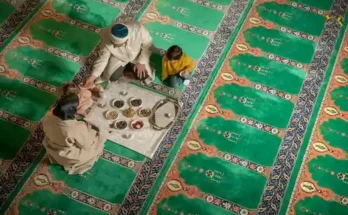Islam is more than a religion; it’s a way of life, a spiritual compass, and a centuries-old dialogue between humanity and the Divine. Rooted in peace, submission, and devotion, Islam has shaped civilizations, inspired millions, and continues to guide hearts around the globe. But to truly understand Islam is to go beyond the headlines, beyond misconceptions, and into its living, breathing core—a place where faith, tradition, and daily life are inseparable.
The Birthplace of a Revelation:
-
The Arabian Sands and a Prophet’s Mission
In the 7th century, amidst the arid deserts of Arabia, a man named Muhammad (peace be upon him) received a revelation that would transform not just a region, but the world. At the age of 40, in the cave of Hira near Mecca, the Prophet Muhammad heard the voice of the Angel Jibreel (Gabriel) commanding him to “Read.” Thus began the descent of the Quran, the holy book of Islam, a scripture believed by Muslims to be the literal word of God (Allah in Arabic).
Islam emerged in a society entrenched in tribal loyalties, inequality, and idol worship. The message of one God, universal accountability, compassion, and justice was both revolutionary and deeply spiritual. It united people not by bloodlines, but by belief.
-
The Quran
The Quran, revealed over a span of 23 years, remains unchanged since its revelation. For Muslims, it is not simply read—it is recited, memorized, and lived. The rhythmic cadence of its verses stirs hearts, while its meaning offers guidance on everything from ethics and family to governance and worship. It is a book that speaks to the soul, demanding reflection, action, and submission to the Divine will.
The Pillars That Uphold Islam:
-
The Five Pillars
At the heart of Islam lie five foundational practices, known as the Five Pillars. These are not empty rituals; they are daily affirmations of purpose and spiritual discipline. The Shahada (declaration of faith) is the first—an unwavering statement that there is no god but Allah, and Muhammad is His messenger. It is the entry point into Islam and the heartbeat of every believer’s faith.
Prayer, or Salah, performed five times daily, is not just obligation—it’s a pause in life to reconnect with the Creator. Zakat, the mandatory giving to the poor, fosters a sense of economic balance and compassion. Fasting during the month of Ramadan teaches self-control, empathy, and gratitude. Finally, the pilgrimage to Mecca, Hajj, is a profound spiritual journey that symbolizes unity, humility, and submission.
-
A Life Anchored in Worship
Worship in Islam is not limited to prayer or fasting. It extends into how one treats others, how one earns and spends, and how one carries themselves in society. Every act done with sincere intention and alignment with divine guidance can be an act of worship—from feeding the hungry to seeking knowledge, from smiling at a stranger to caring for the Earth.
The Prophet Muhammad:
-
A Messenger of Compassion and Wisdom
To understand Islam is to know the life of Prophet Muhammad. He is not worshipped in Islam, but he is revered as the final messenger, a man whose life exemplified the Quran in action. Known as Al-Amin (the Trustworthy) even before his prophethood, he was a father, husband, leader, and spiritual guide.
His treatment of the poor, his mercy toward enemies, his patience in adversity, and his unwavering commitment to justice are not mere stories—they are models of behavior for every Muslim. In him, the abstract ideals of Islam found living expression. To Muslims, loving the Prophet is part of loving God, and following his Sunnah (way of life) is an essential aspect of practicing the faith.
-
The Global Influence of a Humble Shepherd
From humble beginnings as an orphan in Mecca, the Prophet’s message reached across continents. Today, more than a billion people bear witness to his teachings. His farewell sermon, delivered during his last pilgrimage, echoes through time—a call to equality, brotherhood, and accountability. “No Arab is superior to a non-Arab, nor a white to a black,” he declared. These words form a timeless foundation for justice and human dignity.
Islam and the Tapestry of Daily Life:
-
A Faith That Encompasses All Aspects of Being
Islam is not compartmentalized. It permeates every corner of life. There are teachings on how to eat, how to sleep, how to treat neighbors, how to conduct business, and how to deal with hardship. Islam teaches balance—between spiritual and worldly life, between personal rights and communal responsibilities.
Muslims are encouraged to seek knowledge, to care for the environment, to build strong family ties, and to engage in honest work. The spiritual and the practical walk hand in hand. It’s a holistic approach to life that acknowledges the human being as both body and soul.
-
The Role of Community in Islamic Life
The concept of “Ummah” in Islam refers to the global Muslim community, united by shared beliefs and values. Whether one lives in Jakarta or Johannesburg, Istanbul or Indianapolis, the sense of belonging to a larger faith family is powerful. Friday prayers, Eid celebrations, and acts of charity all reinforce this connection.
But Islam also emphasizes the importance of local communities. Visiting the sick, caring for orphans, reconciling disputes, and supporting neighbors are considered acts of high virtue. The mosque is not only a place of worship but also a center for education, social service, and community engagement.
Women in Islam:
-
Spiritual Equality and Social Empowerment
One of the most debated aspects of Islam in the modern world is the role of women. But the religion’s actual teachings may surprise many. Spiritually, men and women are equal before God. The Quran clearly states that both are judged by their faith, actions, and intentions—not by gender.
Islam granted women rights long before many modern legal systems. The right to own property, to inherit, to seek education, and to participate in public life were enshrined in Islamic teachings over 1400 years ago. The Prophet Muhammad’s first wife, Khadijah, was a successful businesswoman, and his later wife Aisha was a renowned scholar and teacher.
-
Cultural Practices vs. Religious Teachings
It’s important to distinguish between cultural traditions and the core teachings of Islam. In many cases, the oppression of women is not a product of Islamic doctrine but of local customs and societal norms that contradict the religion’s spirit. True Islamic practice uplifts, protects, and empowers women, not the opposite.
Islam in a Modern World:
In today’s rapidly changing world, Muslims are navigating new challenges: technological revolutions, globalization, and questions of identity in multicultural societies. Yet Islam remains a steady anchor. Its teachings offer timeless values that speak to contemporary issues—justice, sustainability, mental well-being, and ethics in the digital age.
Young Muslims are finding innovative ways to express their faith—through art, social activism, entrepreneurship, and digital platforms—without compromising their religious principles. Islam is not static; it is a living tradition, constantly engaging with the realities of the present.
Despite misunderstandings and media misrepresentations, the core message of Islam remains clear: peace, mercy, and submission to the One God. The very word “Islam” shares its root with “Salaam,” meaning peace. A Muslim, then, is one who strives for peace—within themselves, with others, and with their Creator.
Conclusion:
Islam is not just about doctrine or law. It is about a deep, personal connection with God. It’s about waking up before dawn to pray while the world sleeps, about feeding the hungry in silence, about forgiving when it’s hardest to do so. It’s about finding serenity in surrender and strength in humility.
To understand Islam is to look beyond stereotypes and into the lived experiences of its followers. It is to hear the echo of the call to prayer in the stillness of evening. It is to witness acts of kindness done without fanfare. It is to explore a faith that, at its essence, calls humanity back to the Divine.




